- Home
- T. H. White
The Once and Future King (#1-4) Page 30
The Once and Future King (#1-4) Read online
Page 30
‘I shall be Sir Palomides.’
‘Oh, Master Gawaine, pray do not leave me alone.’
‘Hold in your noise,’ said Gawaine. ‘You are silly. You ought to be proud to be the bait. Our mother was, yesterday.’
Gareth said, ‘Never mind, Meg, do not cry. We will not let it hurt you.’
‘After all, it can only kill you,’ said Agravaine brutally.
At this the unfortunate girl began to weep more than ever.
‘Why did you say that?’ asked Gawaine angrily. ‘You always try to frighten people. Now she is at howling more than before.’
‘Look,’ said Gareth. ‘Look, Meg. Poor Meg, do not cry. It will be with me to let you have some shots with my catapult, when we go home.’
‘Oh, Master Gareth!’
‘Ach, come your ways. We cannot bother with her.’
‘There, there!’
‘Oh, oh!’
‘Meg,’ said Gawaine, making a frightful face, ‘if you do not stop squealing, I will look at you like this.’
She dried her tears at once.
‘Now,’ he said, ‘when the unicorn comes, we must all rush out and stick it. Do you understand?’
‘Must it be killed?’
‘Yes, it must be killed dead.’
‘I see.’
‘I hope it will not hurt it,’ said Gareth.
‘That is the sort of foolish hope you would have,’ said Agravaine.
‘But I do not see why it should be killed.’
‘So that we may take it home to our mother, you amadan.’
‘Could we catch it,’ asked Gareth, ‘and lead it to our mother, do you think? I mean, we could get Meg to lead it, if it was tame.’
Gawaine and Gaheris agreed to this.
‘If it is tame,’ they said, ‘it would be better to bring it back alive. That is the best kind of Big Game Hunting.’
‘We could drive it,’ said Agravaine. ‘We could hit it along with sticks.’
‘We could hit Meg, too,’ he added, as an afterthought.
Then they hid themselves in their ambush, and decided to keep silence. There was nothing to be heard except the gentle wind, the heather bees, the skylarks very high, and a few distant snuffles from Meg.
When the unicorn came, things were different from what had been expected. He was such a noble animal, to begin with, that he carried a beauty with him. It held all spellbound who were within sight.
The unicorn was white, with hoofs of silver and a graceful horn of pearl. He stepped daintily over the heather, scarcely seeming to press it with his airy trot, and the wind made waves in his long mane, which had been freshly combed. The glorious thing about him was his eye. There was a faint bluish furrow down each side of his nose, and this led up to the eye—sockets, and surrounded them in a pensive shade. The eyes, circled by this sad and beautiful darkness, were so sorrowful, lonely, gentle and nobly tragic, that they killed all other emotion except love.
The unicorn went up to Meg the kitchenmaid, and bowed his head in front of her. He arched his neck beautifully to do this, and the pearl horn pointed to the ground at her feet, and he scratched in the heather with his silver hoof to make a salute. Meg had forgotten her tears. She made a royal gesture of acknowledgment, and held her hand out to the animal.
‘Come, unicorn,’ she said. ‘Lay your head in my lap, if you like.’
The unicorn made a whinny, and pawed again with his hoof. Then, very carefully, he went down first on one knee and then on the other, till he was bowing in front of her. He looked up at her from this position, with his melting eyes, and at last laid his head upon her knee. He stroked his flat, white cheek against the smoothness of her dress, looking at her beseechingly. The whites of his eyes rolled with an upward flash. He settled his hind quarters coyly, and lay still, looking up. His eyes brimmed with trustfulness, and he lifted his near fore in a gesture of pawing. It was a movement in the air only, which said, ‘Now attend to me. Give me some love. Stroke my mane, will you, please?’
There was a choking noise from Agravaine in the ambush, and at once he was rushing toward the unicorn, with the sharp boar—spear in his hands. The other boys squatted upright on their heels, watching him.
Agravaine came to the unicorn, and began jabbing his spear into its quarters, into its slim belly, into its ribs. He squealed as he jabbed, and the unicorn looked to Meg in anguish. It leaped and moved suddenly, still looking at her reproachfully, and Meg took its horn in one hand. She seemed entranced, unable to help it. The unicorn did not seem able to move from the soft grip of her hand on its horn. The blood, caused by Agravaine’s spear, spurted out upon the blue—white coat of hair.
Gareth began running, with Gawaine close after him. Gaheris came last, stupid and not knowing what to do.
‘Don’t!’ cried Gareth. ‘Leave him alone. Don’t! Don’t!’
Gawaine came up, just as Agravaine’s spear went in under the fifth rib. The unicorn shuddered. He trembled in all his body, and stretched his hind legs out behind. They went out almost straight, as if he were doing his greatest leap – and then quivered, trembling in the agony of death. All the time his eyes were fixed on Meg’s eyes, and she still looked down at his.
‘What are you doing?’ shouted Gawaine. ‘Leave him alone. No harm at him.’
‘Oh, Unicorn,’ whispered Meg.
The unicorn’s legs stretched out horizontally behind him, and stopped trembling. His head dropped in Meg’s lap. After a last kick they became rigid, and the blue lids rose half over the eye. The creature lay still.
‘What have you done?’ said Gareth. ‘You have killed him. He was beautiful.’
Agravaine bawled, ‘This girl is my mother. He put his head in her lap. He had to die.’
‘We said we would keep him,’ yelled Gawaine. ‘We said we would take him home, and be allowed to supper.’
‘Poor unicorn,’ said Meg.
‘Look,’ said Gaheris, ‘I am afraid he is dead.’
Gareth stood square in front of Agravaine, who was three years older than he was and could have knocked him down quite easily. ‘Why did you do it?’ he demanded. ‘You are a murderer. It was a lovely unicorn. Why did you kill it?’
‘His head was in our mother’s lap.’
‘It did not mean any harm. Its hoofs were silver.’
‘It was a unicorn, and it had to be killed. I ought to have killed Meg too.’
‘You are a traitor,’ said Gawaine. ‘We could have taken it home, and been allowed to serve at supper.’
‘Anyway,’ said Gaheris, ‘now it is dead.’
Meg bowed her head over the unicorn’s forelock of white, and once again began to sob.
Gareth began stroking the head. He had to turn away to hide his tears. By stroking it, he had found out how smooth and soft its coat was. He had seen a near view of its eye, now quickly fading, and this had brought the tragedy home to him.
‘Well, it is dead now, whatever,’ said Gaheris for the third time. ‘We had better take it home.’
‘We managed to catch one,’ said Gawaine, the wonder of their achievement beginning to dawn on him.
‘It was a brute,’ said Agravaine.
‘We caught it! We of ourselves!’
‘Sir Grummore did not catch one.’
‘But we did.’
Gawaine had forgotten about his sorrow for the unicorn. He began to dance round the body, waving his boar—spear and uttering horrible shrieks.
‘We must have a gralloch,’ said Gaheris. ‘We must do the matter properly, and cut its insides out, and sling it over a pony, and take it home to the castle, like proper hunters.’
‘And then she will be pleased!’
‘She will say, God’s Feet, but my sons are of mickle might!’
‘We shall be allowed to be like Sir Grummore and King Pellinore. Everything will go well with us from now.’
‘How must we set about the gralloch?’
‘We cut out its guts,’ said Agrav
aine.
Gareth got up and began to go into the heather. He said, ‘I do not want to help cut him. Do you, Meg?’
Meg, who was feeling ill inside, herself, made no answer. Gareth untied her hair – and suddenly she was off, running for all she was worth away from the tragedy, toward the castle. Gareth ran after her.
‘Meg, Meg!’ he called. ‘Wait for me. Do not run.’
But Meg continued to run, as swiftly as an antalop, with her bare feet twinkling behind her, and Gareth gave it up. He flung himself down in the heather and began to cry in earnest – he did not know why.
At the gralloch, the three remaining huntsmen were in trouble. They had begun to slit at the skin of the belly, but they did not know how to do it properly and so they had perforated the intestines. Everything had begun to be horrible, and the once beautiful animal was spoiled and repulsive. All three of them loved the unicorn in their various ways, Agravaine in the most twisted one, and, in proportion as they became responsible for spoiling its beauty, so they began to hate it for their guilt. Gawaine particularly began to hate the body. He hated it for being dead, for having been beautiful, for making him feel a beast. He had loved it and helped to trap it, so now there was nothing to be done except to vent his shame and hatred of himself upon the corpse. He hacked and cut and felt like crying too.
‘We shall not ever get it done,’ they panted. ‘How can we ever carry it down, even if we manage the gralloch?’
‘But we must,’ said Gaheris. ‘We must. If we do not, what will be the good? We must take it home.’
‘We cannot carry it.’
‘We have not a pony.’
‘At a gralloch, they sling the beast over a pony.’
‘We must cut his head off,’ said Agravaine. ‘We must cut its head off somehow, and carry that. It would be enough if we took the head. We could carry it between us.’
So they set to work, hating their work, at the horrid business of hacking through its neck.
Gareth stopped crying in the heather. He rolled over on his back, and immediately he was looking straight into the sky. The clouds which were sailing majestically across its endless depth made him feel giddy. He thought: How far is it to that cloud? A mile? And the one above it? Two miles? And beyond that a mile and a mile, and a million million miles, all in the empty blue. Perhaps I will fall off the earth now, supposing the earth is upside down, and then I shall go sailing and sailing away. I shall try to catch hold of the clouds as I pass them, but they will not stop me. Where shall I go?
This thought made Gareth feel sick, and, as he was also feeling ashamed of himself for running away from the gralloch, he became uncomfortable all over. In these circumstances, the only thing to do was to abandon the place in which he was feeling uncomfortable, in the hope of leaving his discomfort behind him. He got up and went back to the others.
‘Hallo,’ said Gawaine, ‘did you catch her?’
‘No, she escaped away to the castle.’
‘I hope she will not tell anybody,’ said Gaheris. ‘It has to be a surprise, or it is no good for us.’
The three butchers were daubed with sweat and blood, and they were absolutely miserable. Agravaine had been sick twice. Yet they continued in their labour and Gareth helped them.
‘It is no good stopping now,’ said Gawaine. ‘Think how good it will be, if we can take it to our mother.’
‘She will probably come upstairs to say good night to us, if we can take her what she needs.’
‘She will laugh, and say we are mighty hunters.’
When the grisly spine was severed, the head was too heavy to carry. They got themselves in a mess, trying to lift it. Then Gawaine suggested that it had better be dragged with rope. There was none.
‘We could drag it by the horn,’ said Gareth. ‘At any rate we could drag and push it like that, so long as it was downhill.’
Only one of them at a time could get a good hold of the horn, so they took it in turns to do the hauling, while the others pushed behind when the head got snagged in a heather root or a drain. It was heavy for them, even in this way, so that they had to stop every twenty yards or so, to change over.
‘When we get to the castle,’ panted Gawaine, ‘we will prop it up in the seat in the garden. Our mother is bound to walk past there, when she goes for her walk before supper. Then we will stand in front of it until she is ready, and all will suddenly step back at once, and there it will be.’
‘She will be surprised,’ said Gaheris.
When they had at last got it down from the sloping ground, there was another hitch. They found that it was no longer possible to drag it on the flat land, because the horn did not give enough purchase.
In this emergency, for it was getting near to suppertime, Gareth voluntarily ran ahead to fetch a rope. The rope was tied round what remained of the head, and thus at last, with eyes ruined, flesh bruised and separating from the bones, the muddy, bloody, heather—mangled exhibit was conveyed on its last stage to the herb garden. They heaved it to the seat, and arranged its mane as well as they could. Gareth particularly tried to prop it up so that it would give a little idea of the beauty which he remembered.
The magic queen came punctually on her walk conversing with Sir Grummore and followed by her lap dogs: Tray, Blanche and Sweetheart. She did not notice her four sons, lined up in front of the seat. They stood respectfully in a row, dirty, excited, their breasts beating with hope.
‘Now!’ cried Gawaine, and they stood aside.
Queen Morgause did not see the unicorn. Her mind was busy with other things. With Sir Grummore she passed by.
‘Mother!’ cried Gareth in a strange voice, and he ran after her, plucking at her skirt.
‘Yes, my white one? What do you want?’
‘Oh, mother. We have got you a unicorn.’
‘How amusing they are, Sir Grummore,’ she said. ‘Well, my doves, you must run along and ask for your milk.’
‘But, Mammy…’
‘Yes, yes,’ she said in a low voice. ‘Another time.’
And the Queen passed on with the puzzled knight of the Forest Sauvage, electrical and quiet. She had not noticed that her children’s clothes were ruined: had not even scolded them about that. When she found out about the unicorn later in the evening she had them whipped for it, for she had spent an unsuccessful day with the English knights.
Chapter VIII
The plain of Bedegraine was a forest of pavilions. They looked like old—fashioned bathing tents, and were every colour of the rainbow. Some of them were even striped like bathing tents, but the most part were in plain colours, yellow and green and so on. There were heraldic devices worked or stamped on the sides – enormous black eagles with two heads perhaps, or wyverns, or lances, or oak trees, or punning signs which referred to the names of the owners. For instance, Sir Kay had a black key on his tent, and Sir Ulbawes, in the opposing camp, had a couple of elbows in flowing sleeves. The proper name for them would be manchets. Then there were pennons floating from the tops of the tents, and sheaves of spears leaning against them. The more sporting barons had shields or huge copper basins outside their front doors, and all you had to do was to give a thump on one of these with the butt—end of your spear, for the baron to come out like an angry been and have a fight with you, almost before the resounding boom had died away. Sir Dinadain, who was a cheerful man, had hung a chamber—pot outside his. Then there were the people themselves. All round and about the tents there were cooks quarrelling with dogs who had eaten the mutton, and small pages writing insults on each other’s backs when they were not looking, and elegant minstrels with lutes singing tunes similar to ‘Greensleeves’, with soulful expressions, and squires with a world of innocence in their eyes, trying to sell each other spavined horses, and hurdy—gurdy men trying to earn a groat by playing on the vielle, and gypsies telling your fortune for the battle, and enormous knights with their heads wrapped in untidy turbans playing chess, and vivandières sitting on the knees of som
e of them, and – as for entertainment – there were joculators, gleemen, tumblers, harpers, troubadours, jesters, minstrels, tregetours, bear—dancers, egg—dancers, ladder—dancers, ballet—dancers, mountebanks, fire—eaters, and balancers. In a way, it was like Derby Day. The tremendous forest of Sherwood stretched round the tent—forest further than the eye could see – and this was full of wild boars, warrantable stags, outlaws, dragons, and Purple Emperors. There was also an ambush in the forest but nobody was supposed to know about that.
King Arthur paid no attention to the coming battle. He sat invisible in his pavilion, at the hub of the excitement, and talked to Sir Ector or Kay or Merlyn day after day. The smaller captains were delighted to think that their King was having so many councils of war, for they could see the lamp burning inside the silk tent until all hours, and they felt sure that he was inventing a splendid plan of campaign. Actually the conversation was about different things.
‘There will be a lot of jealousy,’ said Kay. ‘You will have all these knights in this order of yours saying that they are the best one, and wanting to sit at the top of the table.’
‘Then we must have a round table with no top.’
‘But, Arthur, you could never sit a hundred and fifty knights at a round table. Let me see…’
Merlyn, who hardly ever interfered in the arguments now, but sat with his hands folded on his stomach and beamed, helped Kay out of the difficulty.
‘It would need to be about fifty yards across,’ he said. ‘You do it by 2πr.’
‘Well, then. Say it was fifty yards across. Think of all the space in the middle. It would be an ocean of wood with a thin rim of humanity. You couldn’t keep the food in the middle even, because nobody would be able to reach it.’
‘Then we can have a circular table,’ said Arthur, ‘not a round one. I don’t know what the proper word is. I mean we could have a table shaped like the rim of a cart—wheel, and the servants could walk about in the empty space, where the spokes would be. We could call them the Knights of the Round Table.’

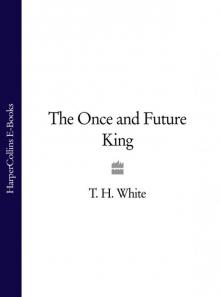 The Once and Future King (#1-4)
The Once and Future King (#1-4) Once & Future King 05 - The Book of Merlyn
Once & Future King 05 - The Book of Merlyn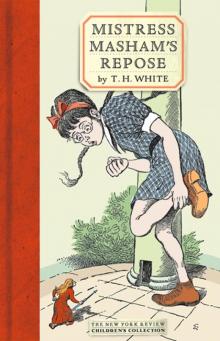 Mistress Masham's Repose
Mistress Masham's Repose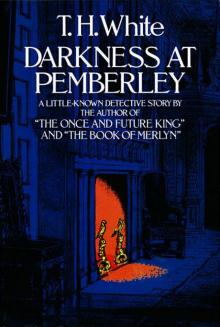 Darkness at Pemberley
Darkness at Pemberley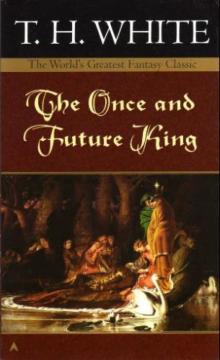 The Once and Future King
The Once and Future King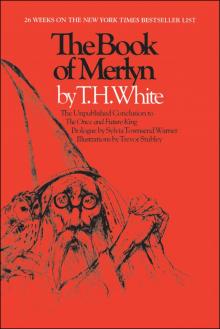 The Book of Merlyn
The Book of Merlyn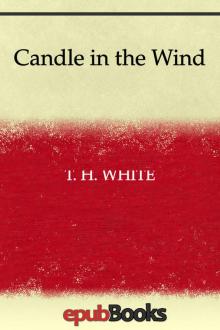 Candle in the Wind
Candle in the Wind